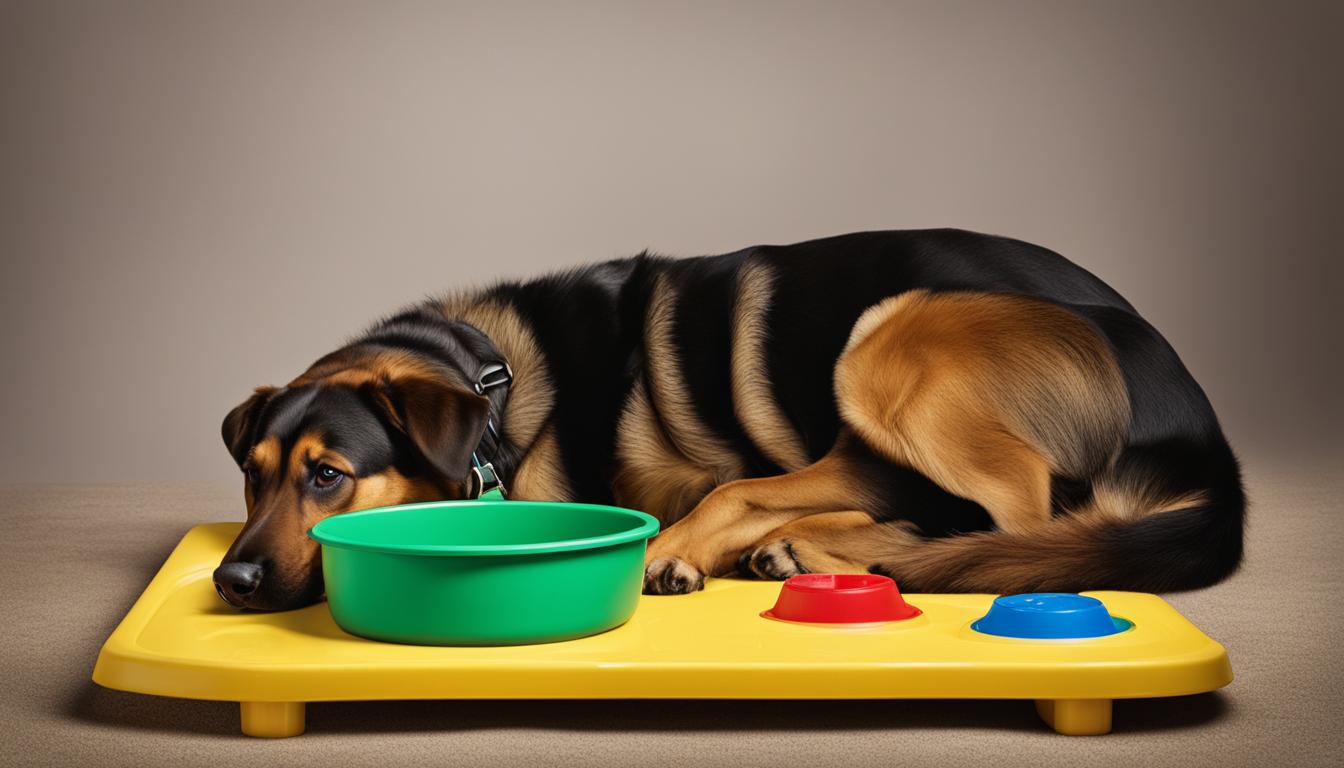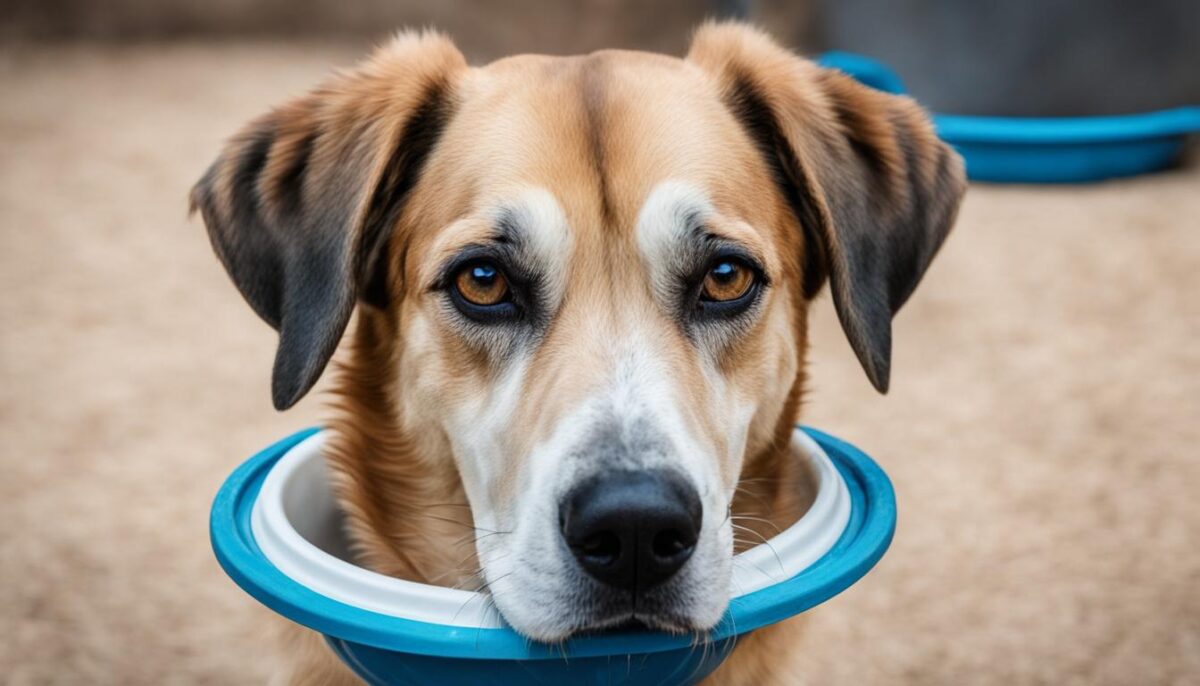Have you ever seen your dog feeling sick and wondered if they can catch the stomach flu like we do? Your furry friend can indeed have a tummy upset that seems a lot like the stomach bug people get. This is often called canine gastroenteritis, and it means your dog’s stomach and intestines are irritated. Just like for you, this can make them feel pretty lousy. Sometimes, if they throw up a lot or have diarrhea, it can be serious, especially if the poop is bloody. That’s a time to get help from a vet fast because your pet’s health is most important.
Every dog might get a dog stomach bug at some point. But don’t worry too much; there are lots of ways to keep your dog happy and healthy. Let’s learn a bit about what might be causing their upset tummy and what you can do to help.
Key Takeaways
- Canine gastroenteritis is a big word for when dogs have an upset stomach.
- Your dog might throw up or have diarrhea if they have a tummy bug.
- A canine stomach bug can be simple, or it can be a sign that your dog needs a vet.
- Taking care of your dog’s health is the best way to help them avoid getting sick.
- If you see blood in their vomit or poop, go to the vet right away, as it might be serious.
Understanding Gastroenteritis in Dogs
If your furry friend is feeling sick, it might be more than just a simple tummy ache. Dogs, just like us, can get a stomach bug that can make them feel really unwell. This is often called gastroenteritis and it’s important for you to understand what it is, so you can help your dog feel better.
What Is Gastroenteritis?
Gastroenteritis is a big word, but it simply means that your dog’s stomach and intestines are inflamed. It’s a way of saying your dog has a serious stomach ache that can cause them to vomit or have diarrhea. Dog health is super important, so knowing about stomach inflammation and intestinal inflammation in dogs helps you care for them better.
Recognizing the Symptoms of Gastroenteritis
When your dog has a stomach bug, you might notice they aren’t their happy, tail-wagging self. They may start throwing up or have runny poops. These signs are clues that your dog’s belly is not happy. If they don’t get enough water, they can get dehydrated, which means their body is losing more water than it’s getting. This can happen really fast, so keep a close eye on them.
Acute Hemorrhagic Diarrhea Syndrome (AHDS)
Sometimes, the stomach bug can be extra mean, and your dog could get something called AHDS. This is a scary version of a stomach bug where your dog can have bloody diarrhea. If you see this, it is very important to go to the vet right away. They’ll know just how to help your dog feel better.
| Common Cause | How It Affects Your Dog |
|---|---|
| Eating Something Bad | Just like you shouldn’t eat candy you find on the ground, your dog might feel sick if they eat something they shouldn’t. |
| Bacterial Infections | Germs can get into your dog’s tummy and make them feel sick, just like when you catch a cold. |
| More Serious Issues | Sometimes it’s something more serious, like their kidneys aren’t working right, which is why a vet check-up is super important. |
Remember, you know your dog best. If you see that they are not feeling good, it is always best to talk to a vet. They are like doctors for pets and will know how to make your dog healthy and happy again!
Identifying the Signs of Dehydration in Dogs
When your furry friend runs around and plays, it’s important to make sure they drink enough water. Just like you feel thirsty after having fun, dogs need to stay hydrated too. Sometimes dogs don’t drink enough water, and that can make them feel sick. Let’s learn how to tell if your dog needs more water.
Simple Tests for Dehydration
Here’s a fun fact: you can do some simple tests to see if your dog is getting enough water. Try gently lifting the skin on the back of their neck – if it goes back down really slowly, they might be dehydrated. Another cool trick is to look at their gums. They should be nice and wet. If they’re sticky, that’s a sign your dog needs water.
When Dehydration Becomes an Emergency
If your dog starts to act really tired, or if they don’t want to eat, it’s time to act fast. These can be signs that your dog needs help because they are dehydrated. If you think your dog is not feeling well, it’s best to call for emergency vet care right away.
Remember, keeping your dog happy and wagging their tail means making sure they have plenty of clean, fresh water to drink every day.
Can Dogs Get the Stomach Flu?
Have you ever had the stomach flu? It’s not fun at all. Guess what? Dogs can feel sick in their tummies too, just like people. But it’s important to know that even if dogs seem to have stomach flu, it might be because of different reasons. For instance, there’s something called norovirus in dogs, which is a germ that can make dogs feel pretty bad.
When your furry friend starts feeling yucky in the stomach, you might wonder if it’s something you can catch. Scientists are learning more every day, and they’ve found out dogs have their very own type of norovirus. They’re also looking into whether dogs can catch the norovirus from us humans and if they can give it back. But so far, they’re not sure. So, just to be safe, it’s a good idea to clean your hands a lot if your dog is sick.
If your dog is throwing up or has a runny tummy, that’s a sign you should take them to the vet. The vet can help make sure your dog gets better and teach you how to clean up properly.
| Dog Tummy Troubles | What You Can Do |
|---|---|
| Vomiting or Diarrhea | Visit the vet |
| Eating Strange Things | Keep your dog away from trash |
| Not Acting Like Themselves | Call the vet for advice |
| Cleaning Up After a Sick Dog | Use gloves and wash hands |
Remember, finding out what’s making your dog feel under the weather is super important. That way, you can both get back to having fun together!
Common Causes Behind Your Dog’s Upset Stomach
If your furry friend is feeling sick, you might wonder why. Like humans, dogs can get upset stomachs, and there are a few usual reasons for this. We will look at what could be causing that sad puppy face and a rumbly tummy.
Dietary Indiscretion and Food Allergies
Sometimes, dogs eat things they shouldn’t. This could be table scraps that are too rich or fatty for them, or even stuff from the trash. Dog upset stomach causes can also come from eating things that don’t fit into a food bowl, like toys or sticks. Another thing for pet parents to watch out for is dog food allergies. These allergies can make their stomachs unhappy and cause other problems like itchy skin.
Infections and Diseases as Trigger Factors
It’s not always what they eat that can give your dogs an upset stomach. Canine diseases like cancer, or issues with their kidneys or liver, can also make dogs sick. Some sneaky bacteria and viruses can lead to belly troubles too. A vet can help figure out what’s going on and how to make your dog feel better.
Here’s a quick list of some stomach bug culprits:
- Too much human food or fatty snacks
- Chomping on things that aren’t food
- Food that’s gone bad or is not meant for dogs
- Bacteria and viruses
- Health problems like kidney or liver disease
To keep your pup’s tummy in tip-top shape, give them food that’s good for them, keep an eye on what they nibble outside, and talk to a vet if their stomach seems upset. They’re there to help your dog get back to being their happy, tail-wagging self!
Veterinary Diagnosis and Treatment
When your furry friend isn’t feeling well, with signs like dog vomiting and diarrhea, it can be stressful. It’s important for a vet to check your dog to see if it has gastroenteritis or something else. Vets are like detectives for health—they look at clues to figure out the problem.
Diagnostic Tests to Determine Gastroenteritis
A vet will check your dog’s tummy to see if it hurts and if your dog is dehydrated. They might need to take a closer look inside with special tests, so they know exactly how to help your dog feel better.
Distinguishing Between Gastroenteritis and Other Conditions
Sometimes the signs that your dog is showing can mean different things. Veterinary care is very good at figuring out if a dog has gastroenteritis or another health problem that needs different treatment.
Here’s a look at what your vet might do to find out why your dog is sick:
| Test | Why It’s Done | What It Finds |
|---|---|---|
| Fecal Analysis | To check for parasites or bacteria in your dog’s poop | Causes of tummy trouble |
| Bloodwork | To look at your dog’s overall health | Signs of infection or health issues |
| X-rays or Ultrasounds | To see inside your dog’s tummy | Blockages or other problems |
If your dog has gastroenteritis, they might get medicine to stop the vomiting, or IV fluids to make sure they stay hydrated. Remember, keeping your dog hydrated and happy is super important!
Managing Your Dog’s Recovery From Gastroenteritis
When your dog comes home from the vet, they will need extra care. The first thing you do is make sure they rest and don’t play with other pets if they could be sick too. If your dog has been throwing up, you might need to stop giving them food and water for a little while. But they will need to drink to not get dehydrated. So, start with giving them a small amount of clear liquids slowly.
Home Care Strategies
Remember, dog care after illness is really important. Here’s a super easy way to take care of your dog at home:
- Find a quiet place for your dog to get better without noise or stress.
- Keep their bed clean and comfy.
- Give them ice chips or a little bit of water to drink if they’ve stopped throwing up.
- Write down how they are acting and feeling to tell the vet.
Dietary Changes for Recovery
Feeding a dog with an upset stomach the right food helps a lot. Start with easy-to-digest food before giving them their regular food again. Here’s what you can give your dog:
| First 1-2 Days | Next Few Days | Week After |
|---|---|---|
| Boiled chicken | Boiled chicken mixed with rice | Less chicken, more rice |
| Small meals | Regular size meals | Transition to regular diet |
For dogs that had a very bad stomach problem like AHDS, stick to food that doesn’t have too much protein or fat. Ask your vet what special food to give them.
Conclusion
When your furry friend gets sick, it’s super important to know how to care for them. Like people, dogs can get sick with tummy troubles. If your dog has an upset stomach, with signs like throwing up or diarrhea, it’s important to act fast. By keeping everything clean and making sure your dog drinks water, you are taking good care of them. Listen to what the vet tells you to do, because they know how to help your dog feel better.
Remember, caring for a sick dog means keeping a close eye on them. If things don’t look right, like if they seem very thirsty all the time or too tired, you should call the vet. They will tell you what to do next. It’s important to help your dog not get dehydrated, which means making sure they have enough water in their body to stay healthy.
Lastly, even though dogs can get tummy bugs, with your love and attention, you can help them get through it. Follow these dog health tips and always check in with your vet. This way, you’ll help your dog bounce back to being their happy, tail-wagging self in no time!
FAQ
Can Dogs Get the Stomach Flu?
While dogs can experience gastrointestinal issues similar to what we refer to as “stomach flu” in humans, it’s important to understand that the causes may be different. Dogs can have gastroenteritis, which is inflammation of the stomach and intestines and can be caused by viruses similar to the norovirus in humans, bacteria, or other factors.
What Is Gastroenteritis in Dogs?
Gastroenteritis in dogs is a general term that refers to the inflammation of the stomach and intestines, which can cause symptoms like vomiting and diarrhea. It can be a result of many different factors, including dietary indiscretion, infections, and more serious underlying health issues.
What Are the Symptoms of Gastroenteritis in Dogs?
Symptoms of gastroenteritis in dogs include sudden vomiting, diarrhea, abdominal pain, lethargy, and loss of appetite. If you notice these symptoms in your dog, especially if they are severe or persist, it’s important to contact your vet.
What Is Acute Hemorrhagic Diarrhea Syndrome (AHDS)?
AHDS is a severe form of gastroenteritis in dogs characterized by sudden onset of bloody diarrhea. It is a life-threatening condition that requires immediate veterinary care to prevent severe dehydration and other complications.
How Can I Tell If My Dog Is Dehydrated?
Signs of dehydration in dogs include a dry nose, pasty gums, and loss of skin elasticity. You can check for dehydration by gently lifting the skin on the back of your dog’s neck or pressing on their gums to see how quickly the color returns. If you are concerned about dehydration, seek veterinary attention immediately.
When Should I Seek Emergency Care for My Dehydrated Dog?
If your dog shows signs of severe dehydration, such as sunken eyes, extreme lethargy, or a delay in capillary refill time when pressing on the gums, you should seek emergency veterinary care without delay.
What Can Cause My Dog’s Upset Stomach?
A dog’s upset stomach can be caused by many factors, including consuming spoiled food or toxic substances, food allergies, bacterial or viral infections, or more serious health issues like kidney or liver disease and certain types of cancer. It’s best to consult with a vet to identify the cause and to provide appropriate treatment.
How Are Infections and Diseases Identified as the Cause of a Dog’s Upset Stomach?
Infections and diseases can be pinpointed as the causes of a dog’s upset stomach through a detailed veterinary examination and diagnostics such as fecal tests, blood work, and imaging. These tests help rule out other conditions and determine the best treatment course.
What Diagnostic Tests Might a Vet Use to Determine Gastroenteritis?
A vet may use a combination of physical examination findings, fecal analysis, bloodwork, X-rays, or ultrasounds to diagnose gastroenteritis in dogs. These tests can help differentiate gastroenteritis from other conditions that present with similar symptoms.
How Do Vets Distinguish Between Gastroenteritis and Other Conditions?
Vets distinguish between gastroenteritis and other conditions based on clinical signs, medical history, and a series of diagnostic tests that can rule out things like gastrointestinal obstructions, tumors, or systemic diseases such as kidney failure.
What Home Care Strategies Are Recommended After a Dog’s Veterinary Treatment for Gastroenteritis?
After returning home from the vet, you should follow your veterinarian’s instructions, which may include withholding food and water for a short period if vomiting was an issue, offering clear liquids in small amounts, and providing a bland, easily digestible diet initially. Isolation may also be necessary if the condition is contagious.
How Should I Alter My Dog’s Diet During Recovery?
During your dog’s recovery from gastroenteritis, it’s recommended to feed them a bland diet consisting of boiled lean meats and rice. Gradually transition back to their regular diet as they recover. If they have had AHDS, a low-fat and low-protein diet may be advised by your vet.


